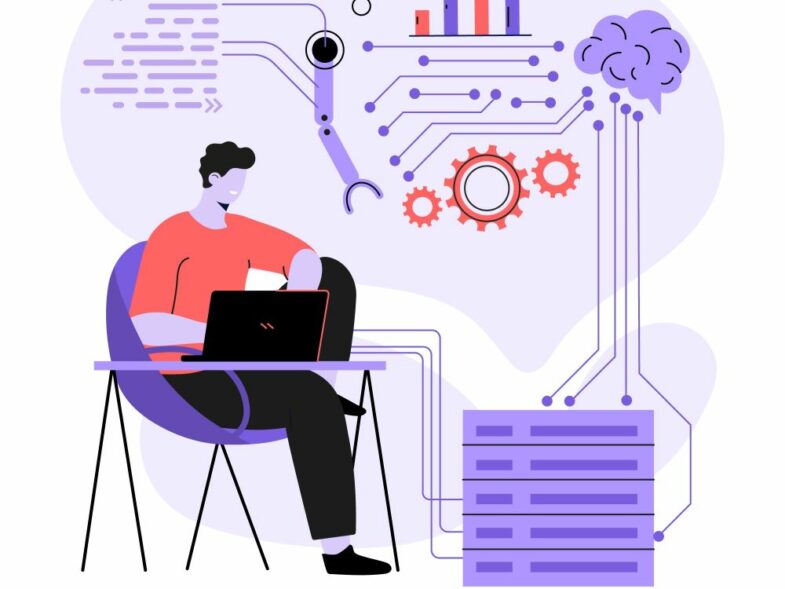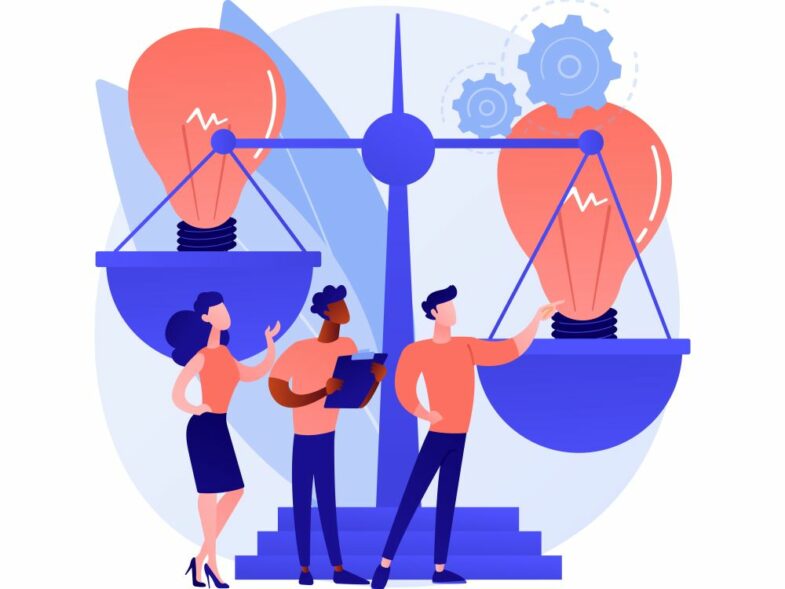Since the last several decades, forward-thinking businesses have tried to adopt some sort of AI; be it the early-conversational chatbots or automated ticketing. And then a couple of years back, in 2022, ChatGPT, the generative AI model emerged as a worldwide phenomenon. As a result, businesses in varied domains, not just the early adopters of AI, began to leverage it as a means of market distinction.
“Gartner states that over 80% of organizations struggle to scale AI projects, and fewer than 20% achieve ROI because of cost, complexity, and skillset challenges.”
Based on stages of future prediction, different statistics collected throughout the years show that AI technology is no longer just a notion for the future. It is already used in the tech industry for real-time decision-making and automation. AI is obviously the main factor behind new company ideas from 2025 and beyond. AI services enable businesses to get ahead of their competition in their field while also setting new standards for users in areas like finance, ecommerce, banking, healthcare, and logistics. Depending on what they need to do, businesses use different kinds of AI consulting services. Companies can choose AI as a Service (AIaaS) services that give them the freedom and ease to use AI tools and resources without having to develop their own infrastructure. This is similar to Software as a Service (SaaS) models.
What is AI as a Service (AIaaS)
AI as a service (AIaaS) is third-party offering that empowers organizations add AI-powered tools and competencies to their systems. AIaaS is a risk-averse and affordable approach allowing businesses to use AI application development capabilities without the need to allocate funds for initial developments and setup.
Understanding AI as a Service in 2025
With AI as a Service, customers gain cloud-based access to leading AI tools along with their integrated models and supporting infrastructure. To leverage AI as a service, businesses can take up pre-configured services offered by several providers like Amazon Web Services, Microsoft Azure, and Google Cloud offer present along with cutting-edge AI startups.
The demand-driven feature of this framework makes it convenient for emerging businesses to begin operating it. Website subscribers have access to advanced AI tools without the need for capital or owning or managing such powerful capabilities. These AI tools use annotated data to train the AI models , so that it can recognize the patterns and handle specific tasks correctly. Many service providers often offer access to curated, labeled datasets as part of their AI-as-a-Service offering.
The artificial intelligence market is expected to grow from USD 371.71 billion in 2025 to USD 2,407.02 billion by 2032 at a CAGR of 30.6% over the forecast period.
This is as per a research study on “Artificial Intelligence (AI) Market by Offering (Infrastructure, Software, Services), Technology (ML, NLP, Generative AI), Business Function (Operations & Supply Chain, Finance & Accounting), Enterprise Application, and End User – Global Forecast to 2032,” and published by MarketsandMarkets.
Core elements of AI as a Service include:
· The capacity of machine learning platforms that are offered as services to find and predict things
· AI customer service chatbots and virtual assistants
· Tools for recognizing speech and images
· Decision management systems help people make decisions by giving them data-based ideas through their decision support features.
These quick changes make businesses see real profit growth at a very fast rate.
The Advantages of Using AIaaS platforms
The AIaaS delivery model lets businesses use AI at a low cost without having to build or keep up with a single AI project. AIaaS systems let businesses create AI services that are flexible, scalable, and easy to use.
AIaaS systems have other benefits, such as:
- Fast deployment
AIaaS is one of the quickest ways to get AI into a business. It is simple to set up and install. There are many methods to use AI; thus, it’s not always possible for a company to build and keep an AI tool for each one. Options that can be changed are quite helpful since they let businesses quickly set up AI services and change them to fit their demands and limitations. You don’t need to know how to code or have very little coding experience. Even if a company doesn’t have its AI developer or programmer, it can still use AIaaS. The only thing the business needs is a layer of no-code infrastructure. Most of the time, you don’t need to know how to write or be an expert in technology to set it up.
- Cost-effective
The primary reason for the growth of AIaaS in the IT business is its cost-saving benefits. AIaaS is a beneficial deal for businesses since they just pay for what they use and the AI features they need, so they don’t have to spend a lot of money up front.
- Straightforward pricing
AIaaS not only cuts down on work that doesn’t bring value, but it also gives people access to AI with clear information about service rates. Businesses only pay for the AI technology they utilize because most AIaaS pricing schemes are dependent on how much they use.
- Scalability
Companies that want to grow should use AIaaS. It’s ideal for activities that don’t bring much value but still involve some amount of mental judgment. AIaaS employs industrial automation to do simple activities without needing people to do them, which gives team members more time to work on other things.
Different Kinds of AIaaS
AI provider platforms offer a range of machine learning and AI options. These several options can meet an organization’s AI needs because they can look at features and prices to find the best fit. Some AI jobs, including heavy workloads, demand special hardware that cloud AI service providers may provide, like graphics processing units.
Here are several forms of AIaaS:
- Bots
Bots and chatbots are used a lot in many kinds of businesses. They employ NLP to sound like actual people and are mostly used in customer service to give clients the answers they need to the questions they ask the most. Companies save time and money by being available 24/7 and letting workers focus on harder jobs. Research by AI company Tidio indicated that 82% of customers would rather utilize a chatbot for customer support than wait for a human to answer their questions.
- Machine Learning
ML helps businesses look at their data, see patterns, make predictions, and learn as they go. This method of processing data is meant to work with little or no human help, which means that businesses may use AIaaS without needing to know a lot about technology. Machine learning (ML) comes in a variety of forms, ranging from pre-trained models to models tailored to specific use cases.
- AI application programming interfaces
An API is a piece of software that lets two programs talk to each other. A third-party airline booking website, like Expedia, Kayak, or CheapOair, is an example of this. These sites use data from multiple airline databases to show offers in one easy-to-find place. Machine vision, conversational AI, and NLP applications like urgency detection and sentiment analysis are other common uses for APIs.
- Data Labeling
Data labeling is the process of adding notes to large volumes of data to make it easier to find. It serves many purposes, including ensuring data accuracy, sorting data by size, and facilitating AI development. We use human-in-the-loop machine learning to label the data. This approach lets people and computers work together all the while and makes it easy for AI to look at the data later.
- IoT
AI processes are built into technologies that connect items to the internet, which are also known as AIoT. The goal is to make IoT activities run more smoothly so that people and machines can work together better and manage and analyze data better. AI is built into the hardware of AIoT devices, which are connected to each other through IoT networks. The devices make and collect data, and the AI looks at it to find ways to make things run more smoothly and get more done.
AI as a Service (AIaaS)—The New Normal Altering the Tech Industry
AI as a Service (AIaaS) is slowly becoming the basis for new ideas. Partnering with Clarion Technologies, an established AI application development company, lets you leverage future-focused AI functions without blocking capital. Needless to say, AIaaS is altering the way organizations function by helping them roll out AI solutions on a wider scale and making operations more effective. This is happening in a world where every industry is attempting to keep up with new technologies.
How Will AIaaS Change Over Time?
The need for AIaaS is growing as companies find new ways to employ AI in their operations. Here are several trends that are making AI more popular and affecting its future:
1.Increased humanlike conversations
AI-powered chatbots are getting better at conversations that feel more human like paving ways for businesses to interact with customers in a highly personalized and meaningful way. By utilizing data from user knowledge bases, AIaaS makes it possible for companies use data to build unique chatbot characters, making it easy to assist and converse with customers.
2. Increased customizations
AIaaS is extremely customizable and adaptable. This key advantage is helping businesses alter ways in which AI responds to customers based on past data collected and previous engagements. These customizations enhance customer experiences strengthening consumer loyalty and more devoted to the brand, which ultimately offers businesses an edge in the market.
3. Fewer big data silos needed
Typically, businesses needed to spend a considerable amount of money on infrastructure and build substantial data silos to train their AI models because they needed a lot of data. With AIaaS, the AI consulting companies train these AI models, so businesses can save them the hassle of gathering and storing a lot of data. This makes AI cheaper and easier for companies of all sizes to use.
4. Enhanced accessibility
As AIaaS continues to soar in popularity, it is also becoming indispensable, with more businesses now able to adopt it. It’s no-code and low-code platform features makes AIaaS easier to implement even for small and medium-sized firms—even for those who aren’t tech-savvy.
5. Ethical AI
This democratization of AI access raises important questions around data privacy, fairness, transparency, and social impact. With the increasing use of AIaaS, major issues such as privacy, ethics, and prejudice in AI are gathering traction. As businesses in technology space race to adopt AI, ethical questions, such as how the training data is gathered, AI’s impact on jobs, and environmental issues become increasingly important. This has begun a very important conversation about how to use AI in a way that is right and why we should.
AIaaS: The Future of Giving the Tech Industry More Power
Early adopters of AIaaS are already realizing the benefits of smoother operations, more productivity, and happier customers. Even if there may be problems with its development, AIaaS is predicted to become as essential to the IT sector as other “as-a-service” products, such as SaaS (Software as a Service) and IaaS (Infrastructure as a Service). AIaaS is making it easier for businesses in all industries to employ AI, which will help them stay competitive in a world that is growing more AI-driven.
Accelerate your digital transformation with expert AI consulting and tailored AI-as-a-Service solutions from Clarion Technologies
Choosing the correct partner is important for getting the most out of AIaaS as it changes the business world. Clarion has a lot of experience making AI solutions that are customized, ethical, and scalable to meet the demands of your organization. Clarion can help you easily incorporate AIaaS, whether you’re a startup trying it out for the first time or an experienced business seeking to make things run more smoothly. These solutions will give your team more power, make things go more smoothly, and encourage new ideas at every step.









